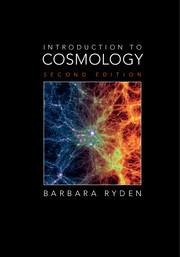Description
Introduction to Cosmology (2nd Ed., Revised edition)
Author: Ryden Barbara
A substantial update of this award-winning and highly regarded cosmology textbook, for advanced undergraduates in physics and astronomy.
Language: English
Subject for Introduction to Cosmology:
Approximative price 52.59 €
In Print (Delivery period: 14 days).
Add to cart
Publication date: 11-2016
276 p. · 18x25.3 cm · Hardback
276 p. · 18x25.3 cm · Hardback
Description
/li>Contents
/li>Biography
/li>
This second edition of Introduction to Cosmology is an exciting update of an award-winning textbook. It is aimed primarily at advanced undergraduate students in physics and astronomy, but is also useful as a supplementary text at higher levels. It explains modern cosmological concepts, such as dark energy, in the context of the Big Bang theory. Its clear, lucid writing style, with a wealth of useful everyday analogies, makes it exceptionally engaging. Emphasis is placed on the links between theoretical concepts of cosmology and the observable properties of the universe, building deeper physical insights in the reader. The second edition includes recent observational results, fuller descriptions of special and general relativity, expanded discussions of dark energy, and a new chapter on baryonic matter that makes up stars and galaxies. It is an ideal textbook for the era of precision cosmology in the accelerating universe.
Preface to second edition; Preface to first edition; 1. Introduction; 2. Fundamental observations; 3. Newton versus Einstein; 4. Cosmic dynamics; 5. Model universes; 6. Measuring cosmological parameters; 7. Dark matter; 8. The cosmic microwave background; 9. Nucleosynthesis and the early Universe; 10. Inflation and the very early Universe; 11. Structure formation: gravitational instability; 12. Structure formation: baryons and photons; Epilogue; Bibliography; Table of useful constants; Index.
Barbara Ryden received her PhD in astrophysical sciences from Princeton University, New Jersey in 1987. After postdocs at the Harvard-Smithsonian Center for Astrophysics and the Canadian Institute for Theoretical Astrophysics, she joined the astronomy faculty at the Ohio State University, where she is now a full professor. She has over twenty years of experience in teaching, at levels ranging from introductory undergraduate courses to advanced graduate seminars. She won the Chambliss Astronomical Writing Award for the first edition of Introduction to Cosmology (2002), and is the co-author, with Bradley Peterson, of Foundations of Astrophysics (2010).
© 2024 LAVOISIER S.A.S.
These books may interest you

Introduction to Cosmology 57.90 €



